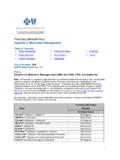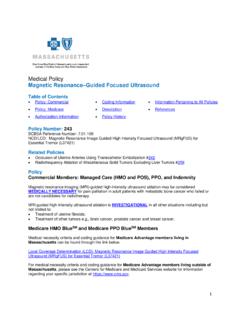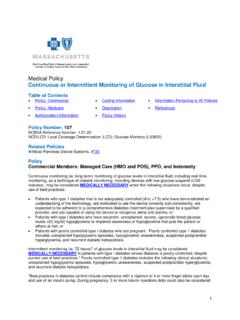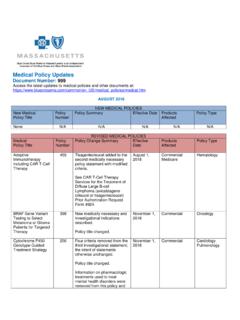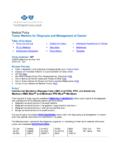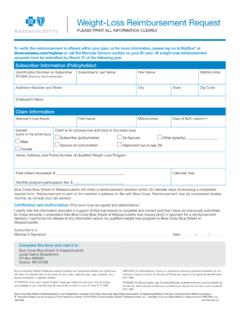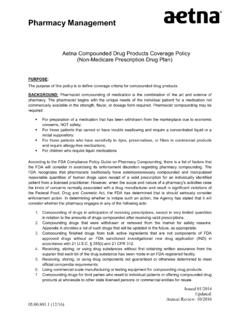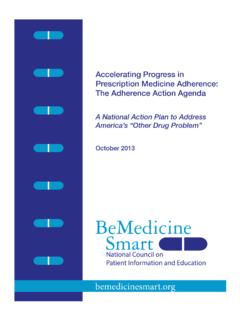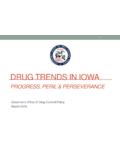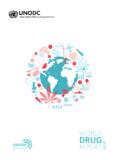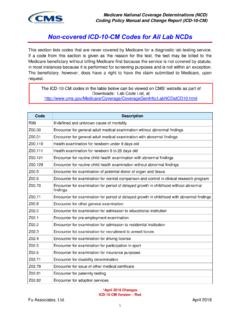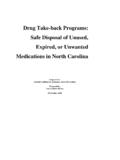Transcription of 251 Drug Management and Prior Authorization
1 Pharmacy Medical policy drug Management & Prior Authorization Table of Contents policy : Commercial Information Pertaining to All Policies Endnotes policy : Medicare References Forms policy History policy Number: 251 BCBSA Reference Number: None policy Commercial Members: Managed Care (HMO and POS), PPO, and Indemnity Note: All requests for outpatient retail pharmacy for indications listed and not listed on the medical policy guidelines may be submitted to BCBSMA Clinical Pharmacy Operations by completing the Prior Authorization Form on the last page of this document. Physicians may also call BCBSMA Pharmacy Operations department at (800)366-7778 to request a Prior Authorization /formulary exception verbally. Physicians may also submit requests for retail pharmacy exceptions via the web using Express PAth which can be found on the BCBSMA provider website or directly on the web at Patients must have pharmacy benefits under their subscriber certificates.
2 Our Formulary BCBSMA maintains a formulary, or a list of covered drugs. At this time, the BCBSMA formulary applies to most members of group HMO, PPO, POS, and indemnity products, and some members of Managed Blue for Seniors. It also applies to members of the direct-pay products HMO Blue-Direct and PPO Blue-Direct. At this time, the formulary does not apply to Medicare Advantage, Medex , direct-pay products such as Managed Major Medical, Comprehensive Managed Major Medical and certain Managed Blue for Seniors plans. A complete list of BCBSMA non-covered drugs is available on the website under Medical Policies #433. If a patient has a Medical Basis for a Non-Covered drug In order to promote clinically appropriate and cost-effective prescription drug use, BCBSMA may require the use of a BCBSMA formulary drug Prior to allowing benefit coverage for a non-formulary drug . Pharmacy benefits and coverage are generally not provided for non-formulary drugs because safe and effective prescription alternatives generally are available on the BCBSMA formulary.
3 The BCBSMA formulary drugs, the covered alternatives in this policy , are used and accepted by regulatory, medical and pharmacy communities. If allowed with Formulary Exception request, the non-formulary drug coverage will be at the highest copayment level and terms as the Plan allows Clinical Coverage Criteria: BCBSMA may authorize coverage for non-formulary prescription medications for a member who meets one of the following clinical criteria: The member has documented treatment failure with two covered formulary drugs (NOTE: If only one covered formulary drug is available, the member must have documented treatment failure with that alternative); or The member has documented adverse effects to two covered formulary drugs, significant enough to preclude use of the covered formulary drug (NOTE: If only one covered formulary drug is available, the member must have documented treatment failure with that alternative).
4 Or There is some other specified clinical basis You can request continued coverage of a non-covered drug through our clinical exception program for members when there is a medical basis for the member not being able to take any of the covered drugs from the same therapeutic class. Physicians or their representatives may call BCBSMA Pharmacy Operations department to request a review for formulary exception for their patients at (800)366-7778. Physicians may also submit requests for retail pharmacy exceptions via the web using Express PAth which can be found on the BCBSMA provider website or directly on the web at Physicians may also request an exception review in writing by using the Formulary Exception Form. The Formulary Exception form is included as part of this document for physicians to submit for patients. Fax or mail the completed form to BCBSMA. We will respond to your request within two business days of receipt.
5 New drug Approval Process For all BCBSMA products, we have an evaluation period before adding new, FDA-approved brand-name drugs to our formulary. During this period, the drug will be considered non-formulary/non-covered (please see the above section titled Our Formulary) while our Pharmacy and Therapeutics Committee analyzes current literature to determine, among other things, the benefits and risks of each new brand-name drug . While we will automatically impose this evaluation period for all brand-name drugs after they receive FDA approval, we may not do so for generic drugs. Once we have decided whether a drug will be included on or excluded from the BCBSMA covered drug list, we will update our formulary. During the time when the drug is being evaluated, physicians can request an exception in the case of medical necessity. If the new drug being evaluated belongs to a therapeutic class that BCBSMA manages through Prior Authorization , step therapy, formulary or Quality Care Dosing, the established current criteria will be applied to the request.
6 Follow the directions above to obtain the Formulary Exception Form. drug Coverage Benefits RU486 (mifepristone):14,16 Covered only for those plans with voluntary termination of pregnancy benefits. For a list of drugs requiring Prior Authorization , see below. For Quality Care Dosing guidelines, see #621. Birth control pills (oral contraceptive pills), birth control (contraceptive) transdermal patches and birth control (contraceptive) vaginal rings are covered according the patient s subscriber certificate. Off-label use of drugs for cancer or HIV/AIDS are covered according to the Massachusetts state mandate. Some self-insured accounts may not provide coverage for drugs listed in the Massachusetts state mandate. Such drugs must be recognized for the treatment of HIV or the specific cancer, and published in scientific literature such as one of the following references: United States Pharmacopeia drug Information American Medical Association drug Evaluation American Hospital Formulary Service drug Information Enteral formula is covered according to the Massachusetts state mandate and BCBSMA s Medical policy coverage criteria.
7 Some self-insured accounts may not provide coverage for enteral formula as listed in the Massachusetts state mandate. Off-Label Indications The Food and drug Administration (FDA) requires that a drug be subject to clinical studies and be FDA approved Prior to, and for, prescription use so that the drug s efficacy and safety is A product approved in this manner for marketing is commonly termed an FDA-approved drug . A drug product sponsor must submit to and have approved by the FDA, the product s NDA, ANDA, or BLA (New drug Application, Abbreviated New drug Application, or Biologic License Application). The FDA approves a drug product and, among other things, it s labeling (container label, package insert, and prescribing information leaflet), dosing and The Food, drug and Cosmetic Act (FDCA) does not limit the manner in which a physician may use an approved drug . Once a product has been approved for prescription, a physician may prescribe it for uses or in treatment regimens or patient populations that are not included in the FDA approved labeling.
8 Such unapproved uses may be appropriate and rational in certain circumstances, and may, in fact, reflect approaches to drug therapy that have been extensively reported in medical These unapproved uses are frequently called off-label uses. While it allows individual personal professional innovation, off-label prescription may discourage, and is not, evidence based practice. While the FDA provides indication-specific use for drugs, the FDA focus is on market entry for prescription drugs rather than regulating physicians prescribing practices. A prescriber s prescription of a drug for uses beyond those formally evaluated by the manufacturer s studies and approved by the FDA is not regulated by the FDA. Off-label prescribing of medications is often thought to be supported by scientific evidence. However, it very often is not and off-label prescription raises key concerns about patient efficacy and safety risks, and costs to the health care Although most prescriptions in a recent study (575 million [79%]) were for FDA approved indications, many (150 million [21%]) lacked FDA approval for the condition they were used to The greatest disparity between supported and unsupported off-label prescription occurred among psychiatric (4% strong support vs.)
9 96% limited or no support) and allergy therapies (11% strong support vs. 89% limited or no support). 17 While allowed to do so, drug prescription for an indication or use not FDA approved requires the prescriber to be well informed about the product, to base its use on firm scientific rationale and on sound medical evidence, and to maintain records of the product's use and effects. Use of a marketed product in this manner when the intent is the "practice of medicine" does not require the submission of an Investigational New drug Application (IND), Investigational Device Exemption (IDE) or review by an Institutional Review Board (IRB). 20 Many off-label uses are effective, well documented in peer-reviewed literature, and commonly used when drugs with labeled uses fail. Criteria in drugs-specific policies take precedence over the criteria used in this policy . Therefore, drug -specific policies must be reviewed Prior to applying the criteria listed below.
10 However, this policy should be applied when drug -specific policy is silent for an off-label use of a FDA approved drug or when developing drug -specific medical policies. Also, Commercial contracts governed by the Commonwealth of Massachusetts insurance law may be subject to the mandates and or Compendia applicability under state and or federal law or regulation. Off-label, or unlabeled, uses of prescription drugs may be considered medically necessary for use when positive health outcomes result, as evaluated by one or all of the following criteria: Well-designed and well-conducted investigations published in peer-review journals; Published in recognized and widely subscribed clinical journals such as, but not limited to, Journal of American Medical Association, New England Journal of Medicine , and Lancet; Evidence that demonstrates clinical improvement and can measured; Beneficial effects should outweigh any harmful effects; Beneficial effects must exceed the net health outcome of established alternatives; Opinions and evaluations by national or other professionally recognized medical associations that support the scientific quality and use of the supporting evidence and rationale.
